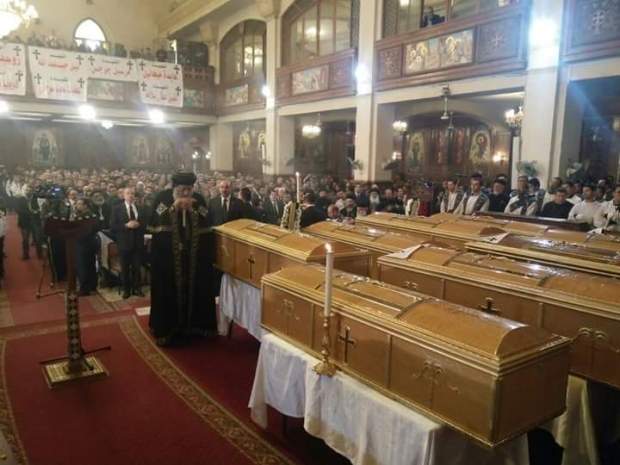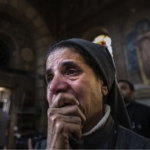By Michael Wahid Hanna –
The December 11th bombing of the St. Paul and St. Peter Church in Cairo, which abuts the seat of the Coptic Orthodox Church, St. Mark’s Cathedral, resulted in 25 deaths and over 50 injuries. The attack on el-Boutrosiyya, as the church locally known, was later claimed by the Islamic State’s affiliate in mainland Egypt, signaling a potentially ominous turn in the country’s years-long struggle against Islamist militancy.
The attack was generally framed as a shift and an escalation, as militant violence has largely taken on and targeted symbols of the Sisi regime and the Egyptian state. Whether this attack represents a sustained shift in tactics and targeting will be borne out in the future. In the Sinai Peninsula, the Islamic State affiliate has recently undertaken specific but limited acts of violence against Copts. But in targeting a congregation of women and children and seeking to maximize harm to civilians, the Islamic State has eschewed its previous tactical reticence and adopted a more spectacular and indiscriminate mode of violence.
That previous reticence is largely rooted in the failures of Egypt’s low-level insurgency of the 1990s, which foundered in the face of limited popular support and unstinting state repression following indiscriminate attacks on civilian and economic targets. However, the shift to targeting Egypt’s most vulnerable community should not be seen in isolation as a mere tactical innovation. Instead, the vulnerability of Egypt’s Christians should be understood more broadly, as a function of their status as second-class citizens in their own country. In practice and form, Sisi’s Egypt offers the Copts a paternalistic form of Islamism that largely avoids top-level stigmatization and indulges in the rhetoric of national unity without offering them equal protection or equal rights.
Pervasive sectarianism is grounded not primarily in the most violent and intolerant visons of Islamist militancy, but instead in the much more ubiquitous forms of non-violent bigotry and religious supremacism that mark much contemporary Egyptian thought. The normalization of notions of second-class citizenship, even through non-violent ideologies or practices, creates a more permissive environment for sectarian violence.
For Islamist militants, Copts have long represented an inviting target; violence against them requires no additional political motivation and little in the way of ideological or theological adaptation. Over the years, particularly during the 1990s and in the post-Mubarak era, the community has suffered from regular attacks, although this past weekend’s bombing marked the most significant such attack.
In the present context, any attack on Egypt’s Christians is bound to both embarrass the government and its pretense to restoring law and order and erode popular support for the Sisi regime. But more importantly, those effects can be achieved while not risking broad-based backlash, with Egypt’s ingrained sectarianism insuring that outrage remains real but limited. It is that sectarianism that enables more virulent forms of hatred for Christians. It should not be at all surprising that a society that views and treats a segment of its population as less than fully equal is also society that produces violence and terrorism against it, often in unaccountable fashion. Such attacks should serve as an indictment of those social and legal constructs and not simply the most malignant and militant such expressions of those underlying sentiments.
Egypt’s Christians do not share in equality of citizenship. That inequality is expressed in both de jure and de facto ways. As a matter of law, Copts remain less than full citizens in the realm of church construction, religious discrimination, and religious conversion. Whether Copts could ever share in equality of citizenship in a legal and constitutional system in which the principles of Islamic sharia serve as the main source of legislation is questionable at best, but as applied by Egypt’s current legal system the answer is unequivocally no.
Copts also face pervasive de facto discrimination in both public and private employment. Nowhere is that discrimination more acutely felt than within the upper reaches of the security establishment, but lack of public representation remains a far-reaching and persistent phenomenon. But discrimination takes more subtle forms in the realm of public education and civics, where Copts, their history, and contributions to Egyptian society are marginalized and overlooked. Various press outlets and religious institutions regularly indulge in scurrilous attacks against Christians, often overlaid with conspiracy theories about Copts and Egyptian politics.
Perhaps most consequentially, violence against Copts, particularly at local levels, is rarely punished. This unaccountability for sectarian violence offers a stark display of the weakness and vulnerability of Christians and the lack of concern of organs of the state for the well-being of a segment of its population. Copts represent a communal issue to be managed to insure basic stability and not individuals deserving and worthy of redress, justice, and accountability.
A state and society that tolerates and normalizes bigotry and sectarianism will also engender more malicious expressions of that hatred. This point is not intended to be hyperbolic and polemical. In fact, its lessons apply well beyond contemporary Egypt and its burgeoning proto-insurgency. As the wave of demagogic and bigoted populism has taken root in mainstream politics throughout the West, it is nearly inevitable that the normalization of even non-violent forms of bigotry will similarly lead to discrimination and in certain circumstances, actual violence. In their rightful empathy for their targeted co-religionists, Egypt and the Arab World should begin to understand the fundamental hypocrisy at the heart of their current complaints about the treatment and perception of Muslims in the West.
Egypt’s gathering violence will continue and may even expand further beyond its current boundaries, but this latest tragedy is the most malignant expression of a much more broadly held prejudice, namely, a society that sees its Christians as less than fully equal.
Michael Wahid Hanna is a senior fellow at The Century Foundation. He is also an adjunct senior fellow at the Center on Law and Security at New York University School of Law.
___________________






